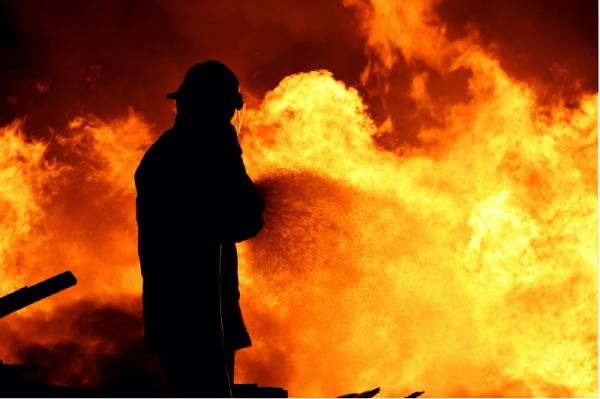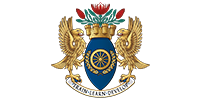Running headfirst into a burning building carrying a hose of rushing water, battling through layers of smoke to find a victim, and then carrying them out to medical services, is definitely not a one-man job. If you embark on fire fighting training at Emcare, a leading training academy offering a variety of qualifications, you will undergo extensive training and will learn about the many facets of the job and the many processes needed in order to be a successful fire fighter. You will also learn a very important lesson and skill, teamwork, which we will discuss in this article!
What is teamwork in fire fighting training?
If you’ve ever experienced a fire emergency or seen any movie involving a fire, you will know that the emergency responders are never alone, there is always an entire team of individuals who are completing different tasks to make sure that you are safe and that the fire is controlled. These individuals have all undergone thorough fire fighting training and will all recognise that they would not be able to do the job alone, it is a team effort. Although you definitely would have heard about the importance of teamwork in a professional working environment, it is so much more significant in relation to emergency services, because people’s lives are on the line.
When we hear about a fire or see the aftermath on the news, it doesn’t necessarily go into the team that made it possible. They don’t show the instructors and fire captains leading their teams and showing them exactly what needs to be done, or the hours of preparation that goes into ensuring each vital piece of equipment is ready and up to standards. They also don’t show the fire prevention team making sure all individuals are safely evacuated, or the driver at the pump panel. Ultimately, there are so many different facets and team members that work together, but that often don’t get the recognition they deserve.
Why is teamwork important in fire fighting training?
When it comes to fire fighting training, you will hear an extensive amount about teamwork and how relevant it is to fire fighting, but it will often not go into the actual reasoning behind the importance of teamwork. Teamwork is vital in fire fighting because it assists in four key elements: problem-solving, motivation, interpersonal skills and efficiency.
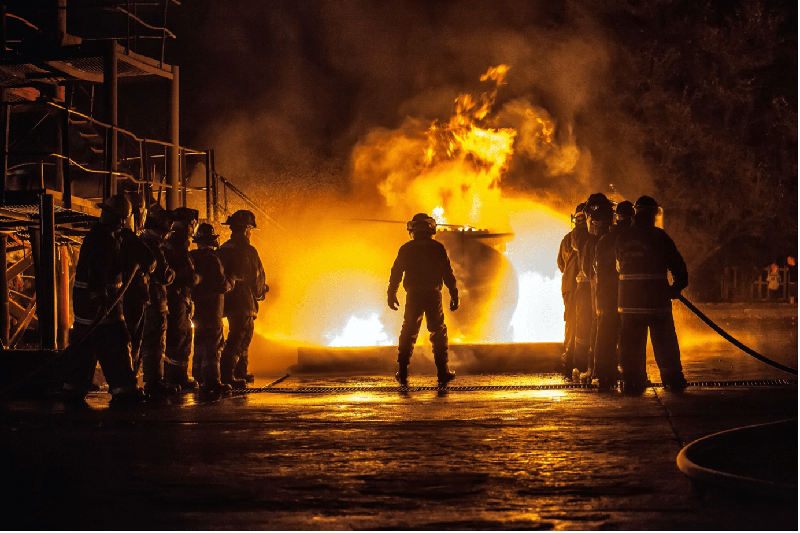
- Problem-solving: Teamwork can greatly assist in improving problem-solving capabilities amongst the entire team because you are constantly working with others, which means that you are continuously exposed to other opinions, methods and viewpoints, which overall leads to a more informed and aware team who are capable of making the best possible decision.
- Motivation: You will learn in fire fighting training that teamwork can also be a beneficial tool for increasing motivation amongst a team. When all members are working together to meet the same end goal they are more likely to feel motivated to carry out their specific aspect of the overall process. If there are elements of healthy competition in the team this will also increase motivation, just ensure that it is healthy competition and not an unhealthy level of contest. Teamwork also means you have a group to share your successes with which boosts morale.
- Interpersonal skills: Another valuable benefit of teamwork is the development of interpersonal skills amongst those involved. As a firefighter, you will often be dealing with high-stress situations where people are emotional and uneasy, which is when you need to be able to read the room and calmly handle matters. Working in a team exposes you to the other ways that people go about things and will equip you to understand their actions and reactions. This development of interpersonal skills will also allow the entire team to overcome weaknesses as a collective, and capitalise on strengths as a collective.
- Efficiency: The final benefit of teamwork or of incorporating teamwork exercises into fire fighting training is that it boosts efficiency. When you become a firefighter you will join a team and will probably spend a significant amount of time at a fire house where the team will spend every minute together and share every activity. This bond created amongst fire fighting units is akin to a family bond, and will help the team communicate and act effectively when responding to a fire emergency.
What are the fundamentals of teamwork in fire fighting training?
When you begin fire fighting training and you start unpacking the various aspects of teamwork, you will learn that there are 4 primary aspects of teamwork which need to be established in order to be a thriving and effective team. They are relationships, communications, procedures and goals.
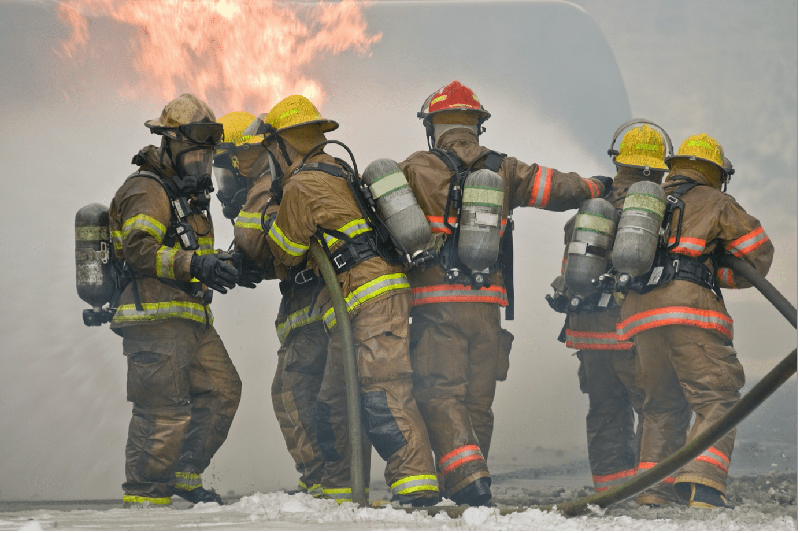
- Relationships: The aspect of relationships is the most important out of the four aspects because it is essentially the foundation for an effective team. While it is certainly possible to be a great team without developing personal relationships with your co-workers, having a further bond with them and forming a trusting relationship with them is incredibly beneficial. Trust is significantly important when it comes to fire fighting because you are not just trusting your colleague to send an email or file a report, you are trusting your teammate with your life and your safety in the line of duty. It is therefore recommended that a fire fighting team dig below surface-level relationships with one another, and that they start forming a relationship of trust.
- Communications: Communication can be successfully achieved without developing a relationship of trust, but is so much more effective with the foundation of trust, which can now be built upon. Communication is largely linked to comfort, and in order for your team to effectively communicate with one another they need to be comfortable enough to voice their opinions and preferred methods with the rest of the team. A team that successfully communicates does not mean that there are no disagreements and it is always a seamless process, but rather means that if there is a disagreement, the entire team can discuss it and proactively come up with a solution, compromise or balance. This does however require that the team members are mature enough to not get offended or personally upset when the team has a different perspective from theirs.
- Procedures: Procedures form a vital part of team work and although there will indeed be standard operation procedures (SOP’s) that the team will need to abide by, there may be more niche or specific procedures that are moulded to match the team dynamic. All fire fighters are immensely strong in many different senses, but some may have more developed skills in specific areas than others, which needs to be recognised. Effectively assessing the strengths and weaknesses of the team members, and then deciding on appropriate procedures while factoring the above in, is an essential aspect of team work in fire fighting training.
- Goals: The fourth and final fundamental aspect of teamwork in fire fighting training is goals. It is common knowledge and basic psychology that setting clear and concise goals is a vital part of productivity, and the same is true for a fire team. These goals can be broad or specific, such as improving bunker times, but ultimately ensure that the team is always working towards a common goal that is for their benefit. It is also worth mentioning that like with other goals, be sure to set realistic and achievable goals that your team has the means to complete, and focus less on abstract or heavy long-term goals.
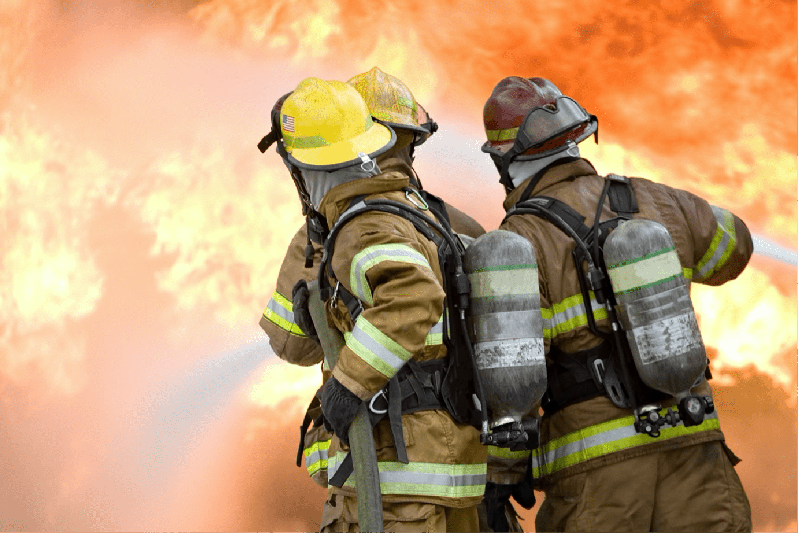
Teamwork from a leader’s perspective in fire fighting training:
Once you’ve gone over the basics of teamwork and how it impacts fire fighting, you may wonder what the role of the leader is in all of this and how a leader can play an important part in teamwork. The role of the leader in fire fighting is so very significant and is a heavy responsibility, these individuals are equipped with an extensive skillset and need to be able to command an entire team, while still mitigating their own actions. There are many different leadership rankings in the fire fighting realm, but for the purpose of this article we will look at a Single Resource Boss and how they can make use of teamwork to be an effective leader.
Effective communication:
A good leader is able to master the skill of effective communication and prioritise being honest with their team. Part of this is ensuring that you communicate with your team in terms of what is expected from them and how exactly to go about meeting or achieving that expectation. As a leader in fire fighting, there is no room for you to be unclear with your team or to be wary of bringing up certain aspects with them.
Included in the spirit of effective communication is how to go about handling conflict or handling a situation where a member of the team is not meeting set standards. In this situation, it is your role as the leader to afford them both constructive as well as positive feedback, and to assist them in meeting any expectations. This feedback system is not a one-way street, and you as the leader should also allow your team to approach you with any concerns and should listen openly and neutrally, which includes making yourself available for one-on-one feedback sessions where the team has an open forum to communicate with you.

Motivate:
The next significant part of your role as a leader is your ability to motivate your team into completing work tasks and to keep a positive attitude whilst doing these activities. An effective way to motivate your team would be to ensure that they always have a crystal clear purpose in mind that they can stick to, and this will mostly be their role as life-savers and heroes. But, when there are elongated periods without any emergencies to respond to, this can cause motivation and morale to take a slight dip, which you can rectify by implementing drills and simulations whereby their passion for the job is reiterated.
Observation:
The next skill that you as a fire fighter leader need to possess is that of vigilant observation. This is an incredibly important skill to possess as you will essentially be making sure that your team is, in all senses of the word, okay. The job comes with a plethora of stresses and instances that can cause anyone to have a mental dip, so as a leader, you need to be continuously aware of the behaviour and mental health of your team, and need to act on it if you see any cause for concern.
Lead by example:
The next skill that you as a leader need to have is to lead by example. There is absolutely no way you will earn the respect and trust of your team if yourself are not practicing what you’re preaching. This means you should always endeavour to follow the appropriate steps and processes, and use the proper equipment etc.

